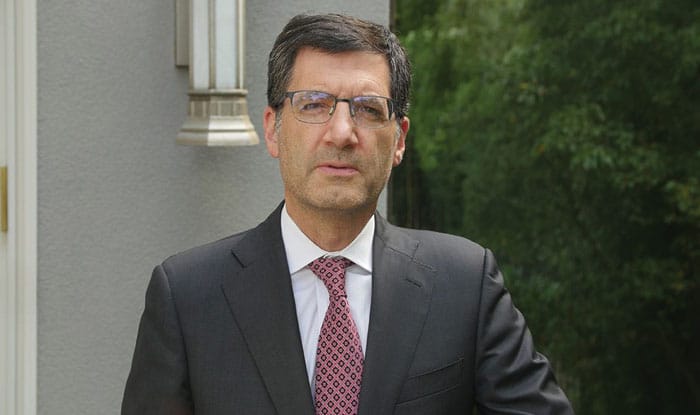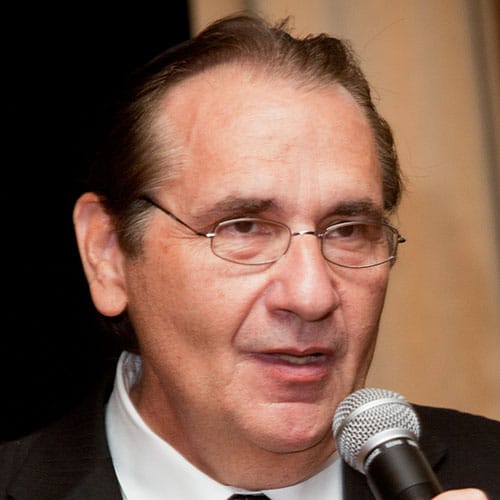 Rabbi Steven Weil Photo courtesy FIDF
Rabbi Steven Weil Photo courtesy FIDF Over the course of a Scholar-in-Residence weekend in Los Angeles, Rabbi Steven Weil, CEO of Friends of the Israel Defense Forces (FIDF), spoke at synagogues and private residences to explain why the organization is such an intrinsic part of the fabric of the State of Israel and the Jewish people.
Rabbi Weil is no stranger to Los Angeles. He served for nine years as senior rabbi at Beth Jacob Congregation in Beverly Hills. Then, for 11 years he was Managing Director of the Orthodox Union (OU) before assuming his current position two years ago.
Rabbi Weil’s appearances were supported by three members of the IDF: Second Lieutenant Yosef, Captain Tal and Captain Guy (last names are left off on purpose). The soldiers visited Jewish day schools on the Friday before Shabbat and also appeared where Rabbi Weil spoke.
Yosef told a gathering on Saturday evening how he grew up in a small religious community that faced antisemitism. “After making aliyah alone at the age of 14 and finishing high school in Israel, I decided to join the IDF as a combat Lone Soldier,” he said. He is currently assigned to the Kedem Battalion of the Home Front Command’s Search and Rescue brigade to protect the settlements in the Judea and Samaria region. Tal is a Machine Officer in the IDF’s 3rd Missile Ship Fleet, the elite unit of Shayetet 3. Guy has been in the IDF since 1999 and serves as the Israeli Naval Attaché to Washington D.C.
The Journal spoke with Rabbi Weil about his work leading the FIDF, the importance of the organization and the role it plays in solidifying a country composed of people from 70 countries with diverse backgrounds.
Jewish Journal: You’ve been a pulpit rabbi, head of a major Jewish organization and now CEO of the FIDF. How do you compare the three jobs?
Rabbi Weil: When you’re a pulpit rabbi, you’re on the frontlines. When you’re running the OU or the FIDF your job is to support those on the frontlines. In the case of the FIDF our job is to support the soldiers as well as veterans and their families through various programs.
JJ: For those who are unfamiliar, please clarify the mission of the FIDF.
RW: The FIDF mission is to transform the lives of those who have served in the IDF through educational, financial, well-being, and cultural initiatives. Every day, the young men and women of the IDF put their lives on the line to protect the Jewish homeland. The FIDF provides these courageous young men and women with a better everyday life and brighter future. What we don’t do is raise money for weapons or military equipment; that’s an unfortunate misconception. The FIDF exists strictly to provide services for those who serve and have served in the IDF.
JJ: As someone with an MBA, financial analysis is something you are very familiar with. How does Israel’s military spending compare with other countries?
RW: It’s quite unbelievable. The average country spends about 2-3% of their GDP on the military. By contrast, Israel spends 14.9% of its GDP on defense. One of the greatest miracles in Jewish history is that Israel exists while having to spend so much on defense. That’s why it’s our responsibility as American Jews to look after those who are serving so they can have a full life after they have given so much of their youth and innocence to the defense of Israel.
JJ: What are the greatest defense challenges Israel faces today as opposed to the 1967 and 1973 wars?
The whole enterprise of war has changed. Not long ago it was whoever controls the air controls the war. Today, whoever controls cyber controls the battle.
– Rabbi Steven Weil
RW: It’s very different today. The whole enterprise of war has changed. Not long ago it was whoever controls the air controls the war. Today, whoever controls cyber controls the battle. Cyber is two things: First, it’s cyber defense. Today, every day in Israel there are over 1,000 cyber attacks. Attacks on the banking system, the water system, the electric grid, defense ministries and so forth. Many of those sophisticated attacks are coming from Iran, from the Shia. Traditionally, the best and brightest in the IDF served in the Air Force and became pilots and paratroopers. What you see today in Israel is the best and brightest, many of whom are women, are the ones who are defending Israel as cyber experts. And, God forbid, if we have to go on the offensive militarily, cyber will be leading the way.
JJ: How has COVID impacted the role of the Israeli army?
RW: The last three quarantines have devastated the Israeli economy. Unemployment has skyrocketed. At the height of COVID, the army was in every town and village giving out pharmaceuticals, delivering food to the needy. These young people were going to the grocery store for the elderly and anyone who couldn’t get there themselves because of the pandemic. And it was not only Jewish communities. IDF soldiers did the same in Arab villages, bringing them food and supplies during the quarantine. There weren’t enough soldiers to do all this work so they called up IDF divisions from all parts of the country to help. It really unified the country.
JJ: We hear about the Lone Soldier. Define that term and how is the FIDF involved in this issue?
RW: There are soldiers in the IDF who don’t have family in Israel. There is nobody cooking for them when they leave the base on a weekend. Nobody to help do their laundry, make them a Shabbat dinner, get them pharmaceuticals. So to help what has become known as the “Lone Soldier” with a sense of home, we rent apartments all over Israel and put in refrigerators stocked with food. We supply kitchens and laundry facilities. We also are now building a $17 million, six-story facility to give soldiers a ‘home away from home.’
JJ: To summarize, what makes the IDF different from other militaries?
RW: The IDF instills in these young people the love of life. Statistically, Israel has among the lowest levels of collateral damage of any country involved in warfare. For the last two Gaza wars, the collateral damage was two civilians to one combatant. [ed. note: The UN estimate for conflicts worldwide is three civilians for every combatant] And we’re talking about asymmetric warfare (a war where one side is not identified in military uniform). It’s unheard of. That’s why it is such vile nonsense what the ICC (International Criminal Courts) and the United Nations Human Rights Council are doing with their war crime investigations and attacks on Israel.
Lastly, it’s important to know that the IDF nurtures its children. Unlike other armies, where so many veterans emerge with PTSD and then deal with their psychological scars, the IDF places psychologists with military groups so they don’t emerge broken when they reenter civilian life. The IDF wants those who gave their youth and their innocence to the country to live normal, healthy lives. The IDF wants them to go on to have functional families so they can continue to build the country for the next generation. They give so much to Israel and the Jewish people, the least we can do is support them and assure they have decent, fulfilling lives.





















 More news and opinions than at a Shabbat dinner, right in your inbox.
More news and opinions than at a Shabbat dinner, right in your inbox.